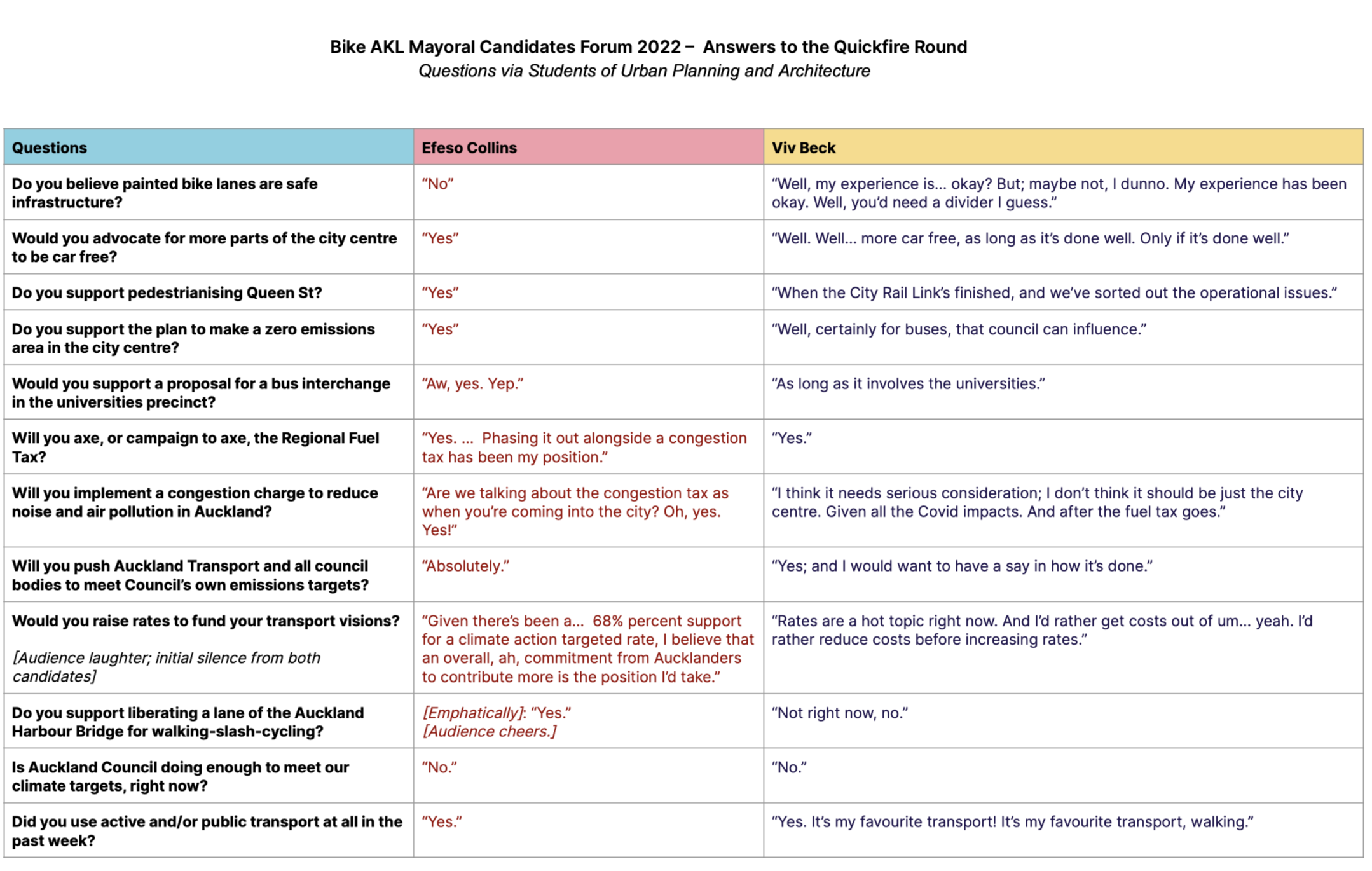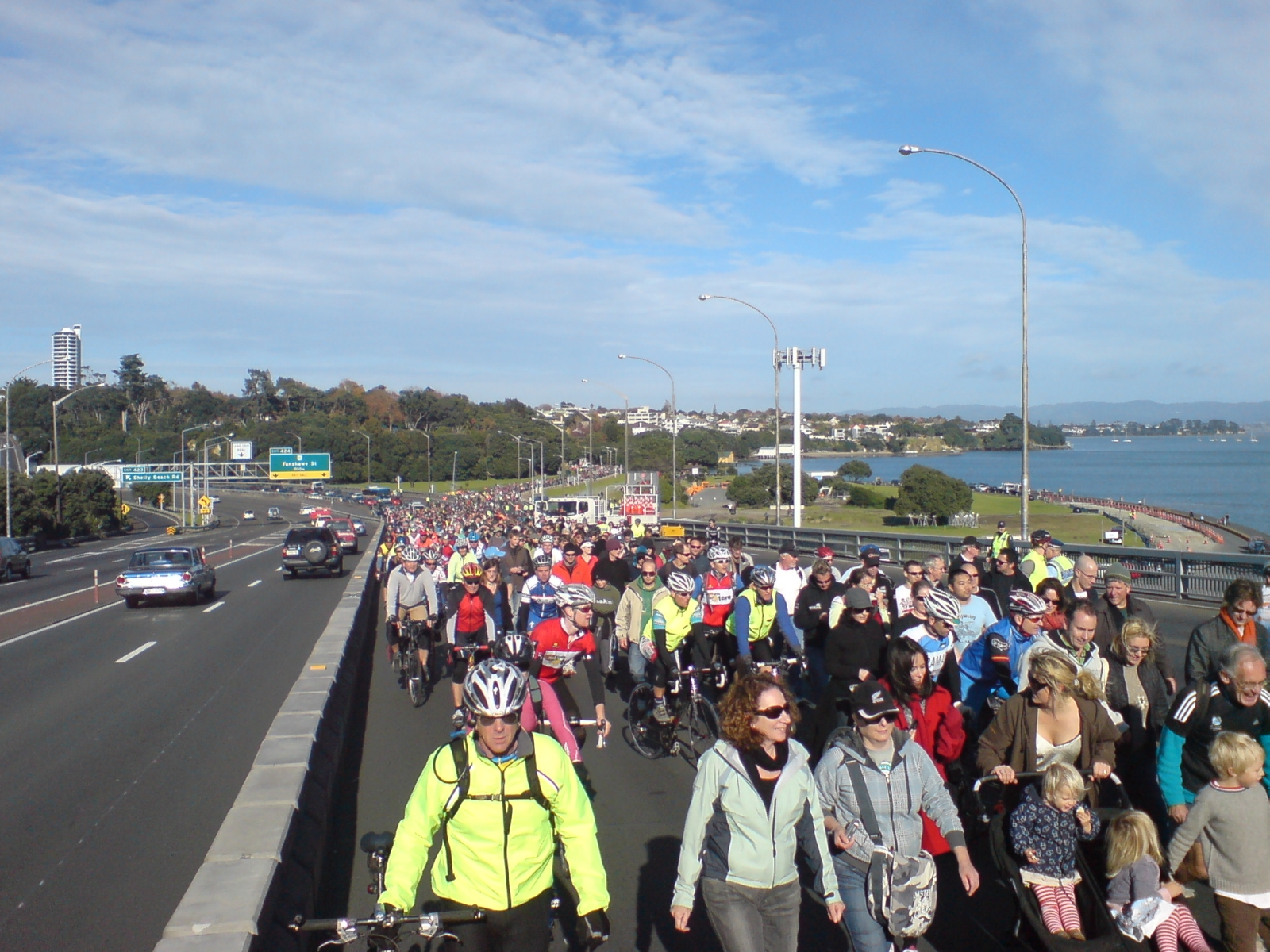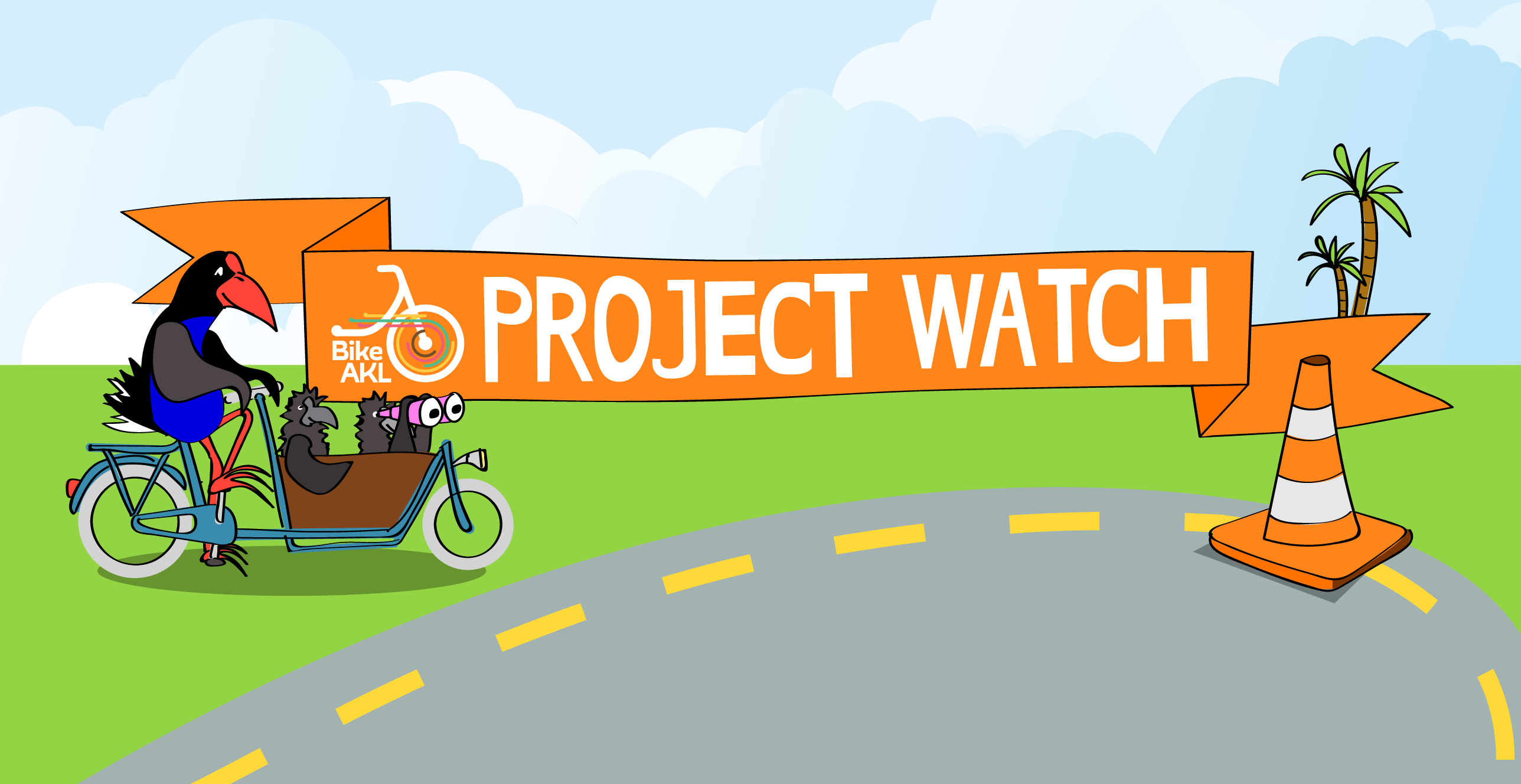‘Bringing the community along’ was the refrain of an evening that brought our community out in force on Tuesday evening. Around 150 people showed up in person and online to hear mayoral candidates Efeso Collins and Viv Beck share their vision for transport at the Bike Champions Forum.
After a welcome by Gabriel Gati from Bike Auckland’s Leadership Group and karakia by Kerrin Leoni, the MC introduced himself: ‘Kia ora koutou, I’m Russell Brown and I rode my bike here. Can we have a show of hands, of who else did?’ A roomful of hands shot up, confirming a bike-friendly crowd.
Over the next hour, the conversation wheeled around bikes and out across the transport landscape. (If you’re keen, you can watch the whole thing on our YouTube channel here.) Both candidates were clear that getting around is a challenge for Aucklanders, and that the way we do so has to change. On some things they converged: congestion is stressful, climate is critical.
Both prefer active and public transport: Beck is a fan of walking, Collins of buses. Both are children of immigrants (Dutch, Samoan). Both shared stories of cycling in cities: Beck biked in Amsterdam as a teen; Collins on the mean streets of Auckland as Local Board Chair, when Auckland Transport loaned him a bike: ‘I was living the challenge of many in my constituency, which was how unsafe we felt on the road.’
The audience shifted in its seats when Beck said existing cycleways ‘don’t seem to be used that much’, which she said contributed to ‘a polarising view around cycling’. Pushed for examples, she offered Franklin Road, and Quay St – which regularly sees 1000-1500 daily trips, even in winter. The data exists, and we really need those who’d lead the city to lead with evidence.
There were clear differences in style and substance, and what Auckland can aspire to in these Covid- and climate-challenged times. Collins’ key sustainable transport policy is free public transport, Beck’s is ‘low-emission fuels’ and electrifying the bus fleet. Beck’s keyword throughout was ‘feasible’ – can it be done? – while Collins’ touchstone word was ‘ambitious’: what should and must be done?
Citing the research that 56% of Aucklanders would ride if there was infrastructure that made it feel safe, Collins highlighted the potential for more cycling, and the equity benefits that will flow: ‘Women, Māori, Pacific, elderly, LGBT communities, children – all of these communities will benefit when we have really good cycling infrastructure.’
Anyone hungry for really big new ideas might have been left feeling peckish, although Efeso Collins’ suggestion of an Active Transport Commissioner for the city – ‘someone focusing on ensuring that the costs around infra aren’t what we argue about’ – has legs (and a useful working example in the UK). He promises more detail in the next week.
Meanwhile, Viv Beck’s early campaign promise of re-opening the Albert Park tunnels – adjacent to the venue – went under-explored. And her confidence that $20 million could make it safe for Auckland’s children to walk and cycle to school didn’t seem to pass the audience sniff test, given there are over 500 schools in the region.
A lot of ground was covered, much more than we can spell out in a short post. Some key points:
What’s your plan to deliver a transport network that’s safe for everyone, including children and disabled people, travelling by bicycle in Tāmaki Makaurau? Collins homed in on ‘tailored’ solutions, giving the example of widened footpaths to created shared paths in Otāhuhu – while noting the epidemic of parking on footpaths. Beck’s eye was on the sunlit greenfields, where it’s theoretically easy to install bike infrastructure from the get-go.
Road reallocation, the key tool in the climate-response toolbox, hardly got a look-in. Tactical projects came up, via the negative reactions to street-change trials in Onehunga and Henderson. ‘How do we lift everybody so the conversations are robust?’ asked Collins, while Beck noted ‘People were really upset.’ Successful trials, like Project WAVE or Emily Place, weren’t mentioned.
Liberating a lane on the Harbour Bridge: starkly divergent responses here. Collins is all for a trial – minimum six months, as long as a year – to ‘give us a good sense of how successful it can be.’ Beck, on the other hand, prefers to wait for the next bridge crossing to be built: ‘I have a different view and I’ve had different advice’.
Other cities are doing big things, noted Russell Brown. For example, Seville installed 80km of bike lanes within one electoral cycle. Why aren’t we doing that?
A long silence ensued. It was broken by Collins, who said it was about bringing the community along with a vision, rather than just preaching at people with evidence. Beck agreed, saying good leadership would ‘bring groups together to make our city better and respect different needs.’
Brown pushed back on this: ‘Seville did listen to communities – but they also said doing nothing was not an option. I think we settle for doing nothing here.’
Do you support the Transport Emissions Reduction Pathway? Collins said yes, and ‘We want to do everything possible to reach those targets.’ Beck was cautious about whether it was feasible: ‘We have to be realistic about the actual targets.’
How do we make it safe for kids to bike to school? Finally reallocation of street space appeared. ‘Sharing the road’ to make protected space for cycling is the key, said Collins. He was adamant that paint is insufficient: ‘I’ve got a 9 year old daughter, I’d have to run alongside her to ensure [her safety] if it was just that kind of, painted space.’
Which overseas city would you consider a good model for Auckland’s future? Great question, interesting answers: Beck mentioned Paris – ‘I’ve been watching what they’ve been doing with interest’ – and cities in Holland and Scandinavia.
Collins nodded to Sāmoa, where ‘we all walk everywhere, everyone uses the bus, and only the very wealthy have cars’, and Melbourne for its trams, and walkable and bikeable areas which have proven benefits to business.
How do we act at pace, in a climate emergency? Brown asked: ‘At what point do we stop trying to bring everyone along?’ He pointed out that one small group had delayed bike infrastructure in his neighbourhood for six long years.
Beck raised the question of ‘feasibility’ again, adding that she prefers ‘a natural migration that works for people’, rather than telling people what to do.
Collins pointed to the need for good messengers, as well as good messages. He also underscored the need to lift voter participation beyond 36%, so we get a council that’s well-supported and ready to move, and doesn’t get stuck making only ‘small steps towards great ambitions.’
Do we need a culture change at Auckland Transport? As Brown put it, ‘Everyone hates AT, but everyone hates AT for different reasons.’ Both candidates pointed to the need for leadership; with Collins adding that he believes most civil servants are in the job to improve the city, so leadership has to ‘allow people to flourish and prosper and bring all their ideas.’
Open Streets/ ciclovias: can we have them, starting with Tamaki Drive one Sunday a month, say? The final question from the MC wistfully recalled that one time Karangahape Road was closed to traffic and open to people… which was over six years ago.
Surprisingly, neither candidate seized on this proven people-pleaser. Both steered towards a ‘yes, but’ – you guessed it: we need to bring the community along. (Have you met Open Streets events? They literally bring the community along!)
A bonus round of rapid-fire yes/ no questions was expertly delivered by Sahil, co-chair of Students of Urban Planning and Architecture. Well worth watching these clips (or you can pick up the YouTube broadcast at this point). We’ve summarised the answers in a handy chart below.

‘We’ve got to stop dragging two tons of metal around the corner to buy 3 kilos of groceries… we need to talk less about [cycle] superhighways, and more about how we get to the damn supermarket.’
Quote of the night from MC Russell Brown, on the topic of where we need cycling infrastructure to go.
The session ended with a koha to thank the candidates for their time: a copy of Movement: How to Take Back our Streets and Transform our Lives and The Ideal City: Exploring Urban Futures. Both are essential reading for anyone looking to lead a city through this critical climate decade.
You can rewatch the full session on our YouTube channel here, and see our previous coverage of mayoral candidates here. There’s also a great write-up over at The Spinoff.
And above all, please vote, and encourage your friends and family to do so too!
PS A great thread of after-match reflections from Russell:
(Note from Bike Auckland: Russell states in this thread that Viv and Efeso were invited as the two most bike-friendly candidates. Our choice in inviting these two candidates was not to endorse them as the most bike-friendly candidates – there are other candidates who have bike-friendly stances as well and we encourage you to read this blog for more information on Mayoral candidates transport policy.)




